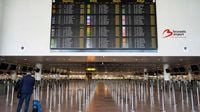On March 31, 2025, a national strike paralyzed Belgium, as workers from both the public and private sectors united to express their discontent with budget cuts announced by the new "Arizona" coalition government. This unprecedented strike, organized by several major unions, marked a significant moment in Belgian labor history, reflecting widespread frustration over proposed reforms that threaten pensions, unemployment benefits, and public services.
The coalition, led by Flemish nationalist Bart de Wever, comprises socialists (red), Christian Democrats (orange), liberals (blue), and Flemish nationalists (yellow). The coalition’s nickname, "Arizona," derives from the colors of the participating parties, mirroring the American state flag. The planned budget cuts and accompanying reforms are expected to have far-reaching consequences on the labor market and public services, igniting a wave of protests across the nation.
On the day of the strike, air traffic, public transportation, and various services were severely disrupted. In Flanders, less than half of the scheduled buses and trams were operational, while the national railway service provided only minimal service, as mandated by law, with fewer than half of the trains running. Schools across the country closed their doors, and public services, including postal and garbage collection, came to a halt. Ports in Antwerp and Zeebrugge also experienced partial disruptions, although the impact on healthcare services and food stores remained minimal.
The effects of the strike were felt internationally, particularly at Brussels Airport, which canceled 244 flights and warned that incoming traffic could also be affected. Belgium’s second airport, Charleroi, canceled all incoming and outgoing flights. The national airline, Brussels Airlines, followed suit, canceling all departing flights and nearly all incoming flights, significantly impacting connections from Germany, Italy, and Spain.
Stefano Scibetta, a senior delegate from the General Federation of Labor of Belgium (FGTB), highlighted the growing discontent among workers, stating, "Today, it is true that the movement is very popular because people are fed up. Nobody wants to work until 67 years old for less money." Scibetta emphasized the financial success of their sector, noting that they generated a billion euros in revenue this year while facing salary freezes.
As the strike unfolded, it became clear that the discontent towards the government was deepening, with strikes becoming increasingly frequent in Belgium. The unions have indicated that this was not just a one-time protest but part of a broader movement against the government's austerity measures. The CGSP Cheminots, CSC-Transcom, SLFP, Sic, and Sact unions announced a joint front for a 24-hour rail strike scheduled for April 8, with additional strikes planned for the following Tuesdays: April 15, 22, and 29.
In the wake of the strike, the unions expressed that they do not foresee an end to their actions against the De Wever government's pension reform projects. Chris Reniers, president of the socialist public service union ACOD/CGSP, acknowledged the importance of their discussions with Pensions Minister Jan Jambon but asserted, "This first step does not mean the end of actions. Many other steps must follow, as the measures under consideration have such an impact on citizens that they are not reassured. Other actions will undoubtedly follow."
The economic impact of the strike was significant. Estimates suggest that the strike could cost the Belgian economy approximately 1.5 billion euros per day, with around 300 million euros attributed to the disruptions experienced by one in five companies unable to operate normally. The Federation of Belgian Companies (FEB) remarked on the dire economic consequences, stating that the impact is "really disastrous" and calling for necessary reforms to secure the future.
Despite the challenges posed by the strike, the unions remain resolute in their plans for continued action. Starting the following week, the SNCB (Belgian National Railway Company) services will face disruptions on April 8, 15, and 22, with three days of protests scheduled in schools from April 7 to April 10. The unions have also announced a new national mobilization planned for April 29.
The general strike on March 31 was not limited to the public sector; it also significantly affected private sector workers, impacting major companies in the industrial and transportation sectors. In Hainaut and the province of Liège, the strike mobilization was particularly pronounced, with nearly twenty actions reported in each province.
While some businesses remained operational, the overall impact of the strike was felt across various sectors. Kristel Van Damme, a representative from the ACV (CSC), noted that while many stores remained open, there were still significant disruptions in certain areas, particularly in Brussels and Antwerp, where union actions forced some businesses to close.
The ports faced their own challenges, particularly in Ghent and Antwerp, where approximately forty ships were left waiting due to the absence of pilots necessary for navigation. In Wallonia, five locks were closed, further complicating inland navigation.
As the situation develops, the unions are determined to maintain their momentum. They have expressed a commitment to continue advocating for workers' rights and pushing back against government policies perceived as detrimental to the working class. With the next wave of strikes on the horizon, it is clear that the labor movement in Belgium is poised for a significant confrontation with the government.



